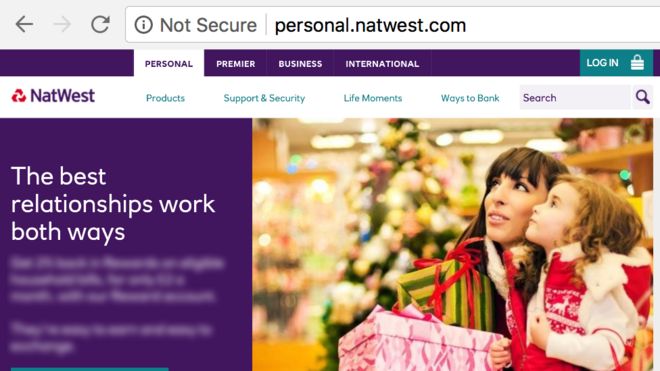
The Natwest website shows as "not secure" in some web browsers
NatWest bank has upgraded the security of its site, following a spat with security specialists who detected a defenselessness.
A few specialists had inquired as to why a few banks utilized encoded HTTPS associations for web based saving money, yet not on their primary client confronting sites.
At the point when security master Troy Hunt disclosed to NatWest its site "required settling", the bank answered "sorry you feel along these lines".
Be that as it may, the bank told the BBC it would roll out improvements inside 48 hours.
The progressions were actualized on Thursday night.
In a blog entry, Mr Hunt recommended aggressors could divert guests attempting to get to NatWest's internet managing an account benefit, from the official deliver nwolb.com to something outwardly comparable, for example, nuuolb.com.
Presently a while later, NatWest enrolled the nuuolb.com web address. Yet, Mr Hunt, who has beforehand affirmed before US Congress on issues of digital security, said the bank had overlooked what's really important.
"We're seeing 'Not secure' beside the address bar," he said. "I would opine that 'Not secure' isn't what you need to see on your bank."
A representative for RBS, which claims NatWest, told the BBC: "We take the security of our administrations to a great degree truly. While we don't right now uphold HTTPS on some of our sites, we are working towards overhauling this in the following 48 hours.
"Our web based managing an account channel is secured with HTTPS."
A few others
Security specialists found a few other real banks did not utilize HTTPS on their landing pages.
In the first place Direct told the BBC: "This usefulness is something we're as of now evaluating."
Lloyds Banking Group said the sites for Lloyds and Halifax did regularly utilize HTTPS, however had likewise "permitted HTTP get to" if individuals wrote in the web address physically.
"We are in the last phases of rectifying this," a representative told the BBC. It actualized changes on Thursday evening.
Tesco Bank has not reacted to the BBC's ask for input.
Presentational dim line
What's the issue?
Web based managing an account sites utilize HTTPS associations with help keep client information private.
At the point when a site utilizes HTTPS (Hyper Text Transfer Protocol Secure), any data sent between your gadget and the site is encoded, so it can't be perused on the off chance that it is blocked.
In any case, security scientists found a few banks did not utilize HTTPS on whatever remains of their sites, including the landing page on which guests arrive.
NatWest initially tweeted that it didn't utilize HTTPS on its landing page since it just contained "general data".
In any case, the analysts proposed that without HTTPS an aggressor could hypothetically change components of a bank's site. They could send casualties to a phony web based managing an account webpage and take their data.
"The landing page is shaky so you can't put stock in anything on it," said Mr Hunt.
"This is a keeping money site. No reasons," included Stephen Kellett, from security firm Software Verify. "All pages, in the case of performing exchanges, the landing page, the about page, the entire parcel, they should all be secure. Why? Since they all dispatch the login page."
Presentational dark line
How valid is the risk?
"There are different ways this can be abused, to draw the customer on to a phishing site," said Dr Mark Manulis, from the Surrey Center for Cyber-security.
A phishing page is intended to resemble a honest to goodness site to trap individuals into giving over individual data.
"It's conceivable to parody the site and make a phony login catch. Phishing assaults for quite a while have been a noteworthy danger and can be very advanced. This makes such assaults less demanding."

No hay comentarios:
Publicar un comentario